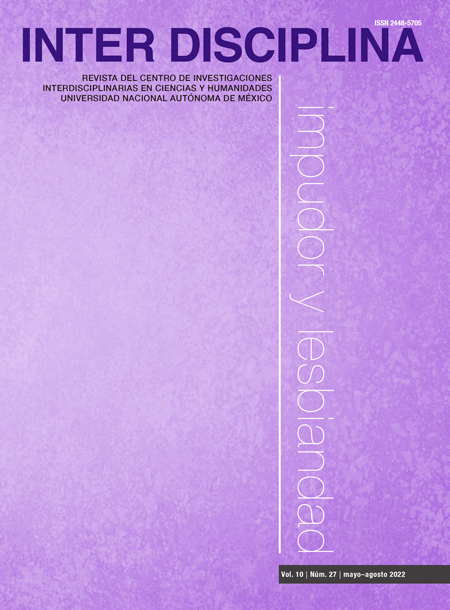Fronteras entre ciencia y política en los espacios deliberativos
Contenido principal del artículo
Resumen
Descargas
Detalles del artículo
Citas en Dimensions Service
Citas
Bernal, John. 1975. La libertad de la necesidad. Madrid: Ayuso.
Bijker, Wiebe, Roland Bal y Ruud Hendriks. 2009. The paradox of scientific authority: the role of scientific advice in democracies. Cambridge: The MIT Press.
Bijker, Wiebe; Thomas Highes y Trevor Pinch (eds.). 1986. The social construction of technological systems. New direction in the sociology of technology. Cambridge: MIT Press.
Bucchi, Massimiano. 2009. Beyond technocracy: science, politics and citizens. Nueva York: Springer.
Callon, Michel, Pierre Lascoumes y Yannick Barthe. 2001. Acting in a uncertain world: an essay on technical democracy. Cambridge: MIT Press.
Callon, Michel y John Law. 1982. On interest and their transformation: enrolment and counter-enrolment. Social Studies of Science, 12: 615-625. https://doi.org/10.1177/030631282012004006
Collins, Harry y Robert Evans. 2007. Rethinking expertise. Chicago: The University of Chicago Press.
Dryzek, John et al. 2020. Global citizen deliberation on genome editing. Science, 369(6510): 1435-1437. https://doi.org/10.1126/science.abb5931
Dryzek, John y Christian List. 2003. Social choice theory and deliberative democracy: a reconciliation. British Journal of Political Science, 33: 1-28. https://doi.org/10.1017/S0007123403000012
Dryzek, John. 1990. Discursive democracy: politics, policy and science. Cambridge: Cambridge University Press.
Elster, Jon.1999. Juicios salomónicos. Gedisa: Barcelona.
Fishkin, James. 2009. When the people speak: deliberative democracy and public consultation. Oxford: Oxford University Press.
Fishkin, James. 1991. Democracy and deliberation: new directions for democratic reform. New Haven: Yale University Press.
Funtowicz, Silvio y Jerome Ravetz. 1997. Environmental problems, post-normal science, and extended peer communities. Études et Recherches sur les Systèmes Agraires et le Développement, 30: 169-175.
Gieryn, Thomas. 1983. Boundary-work and the demarcation of science from non- science: strains and interests in professional ideologies of scientists. American Sociological Review, 48 (6): 781-795.
Guston, David. 1999. Evaluating the impact of the first U.S. citizen panel on telecommunications and the future of democracy. Science, Technology & Human Values, 24 (4): 451-482. https://doi.org/10.1177/016224399902400402
Hamilton, Alexander. 2012. El federalista. Ciudad de México: Fondo de Cultura Económica.
Hempel, Carl. 1979. La explicación científica. Estudios sobre la filosofía de la ciencia. Barcelona: Paidós.
Jasanoff, Sheila. 2003. Technologies of humility: citizen participation in governing science. Minerva, 41: 223-244, 2003. https://doi.org/10.1023/A:1025557512 320
Johnson, James. 2001. Argumentos a favor de la deliberación. Algunas consideraciones escépticas. En Elster, Jon, La democracia deliberativa. Barcelona: Gedisa, 207-235.
Joss, Simon. 1998. Danish consensus conferences as a model of participatory technology assessment: an impact study of consensus conferences on Danish Parliament and Danish public debate. Sience and Public Policy, 25(1): 2-22. https://doi.org/10.1093/spp/25.1.2
Joss, Simon y John Durant (eds.). 1995. Public participation in science: the role of consensus conferences in Europe. DG Digital GeorgeTown. https://repository.library.georgetown.edu/handle/10822/879297
Kitcher, Philip. 2011. Science in a democratic society. Nueva York: Prometheus Books.
Latour, Bruno y Woolgar, Steve. 1995. La vida en el laboratorio: la construcción de los hechos científicos. Madrid: Alianza Universidad.
Merton, Robert. 1942. The sociology of science: Theoretical and empirical investigations. Chicago: The University of Chicago Press.
Pelacho, M. et al. 2021. Science as a commons: improving the governance of knowledge through citizen science. En Vohland, K. et al. (eds.), The science of citizen science. Cham: Springer, 57-78. https://doi.org/10.1007/978-3-030-58278-4_4
Polanyi, Michael. 1962. The Republic of Science: its political and economic theory. Minerva, 1(1): 54-73
Popper, Karl. 1962. La lógica de la investigación científica. Madrid: Tecnos.
Przeworski, Adam. 2001. Deliberación y dominación ideológica. En Elster, Jon (comp.), La democracia deliberativa. Barcelona: Gedisa, 183-207.
Rowe, Gene, Roy Marsh y Lyn Frewer. 2004. Evaluation of a deliberative conference. Science Technology Human Values, 29(88): 88-121.
Stokes, Susan. 2001. Patologías de la deliberación. En Elster, Jon (comp.), La democracia deliberativa. Barcelona: Gedisa, 161-183.
Thompson, Dennis. 2019. Teoría democrática deliberativa y ciencia política empírica. Estudios Políticos, 56: 270-313. https://doi.org/10.17533/udea.espo.n56a12
Zapata, Miguel. 2018. El papel de las emociones en la deliberación sobre riesgos. En Calderón, Edith y Antonio Zirión (eds.), Cultura y afectividad: Aproximaciones filosóficas al estudio de las emociones. CDMX: Ediciones del Lirio/UAM, 217-238.

Esta obra está bajo una Licencia Creative Commons Atribución-NoComercial-SinDerivar 4.0 Internacional.





